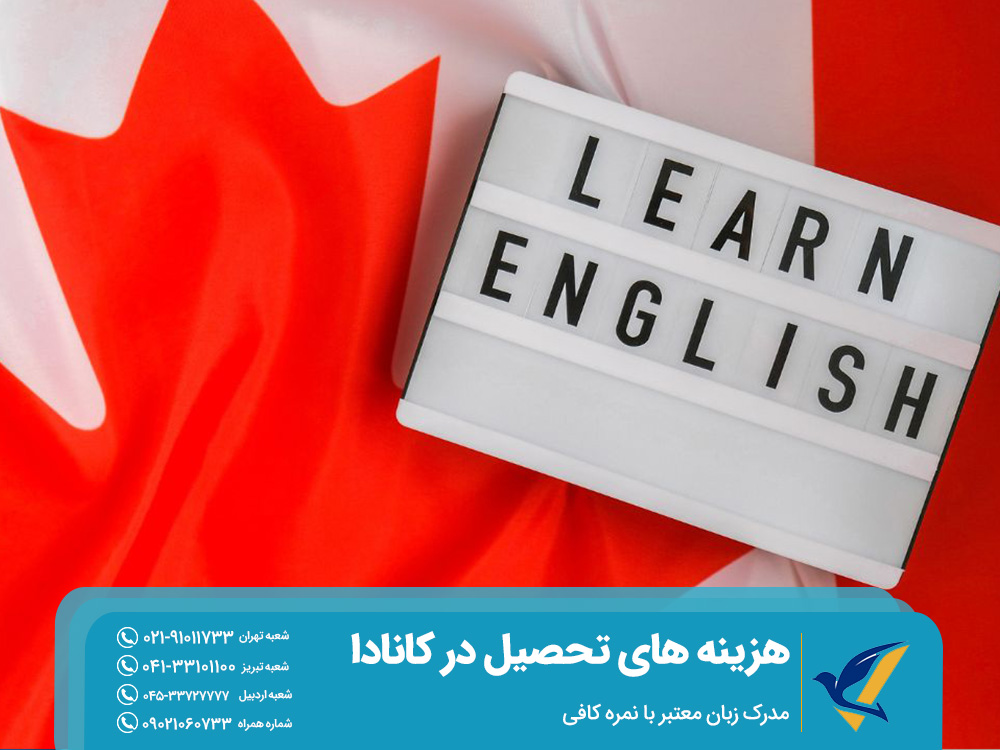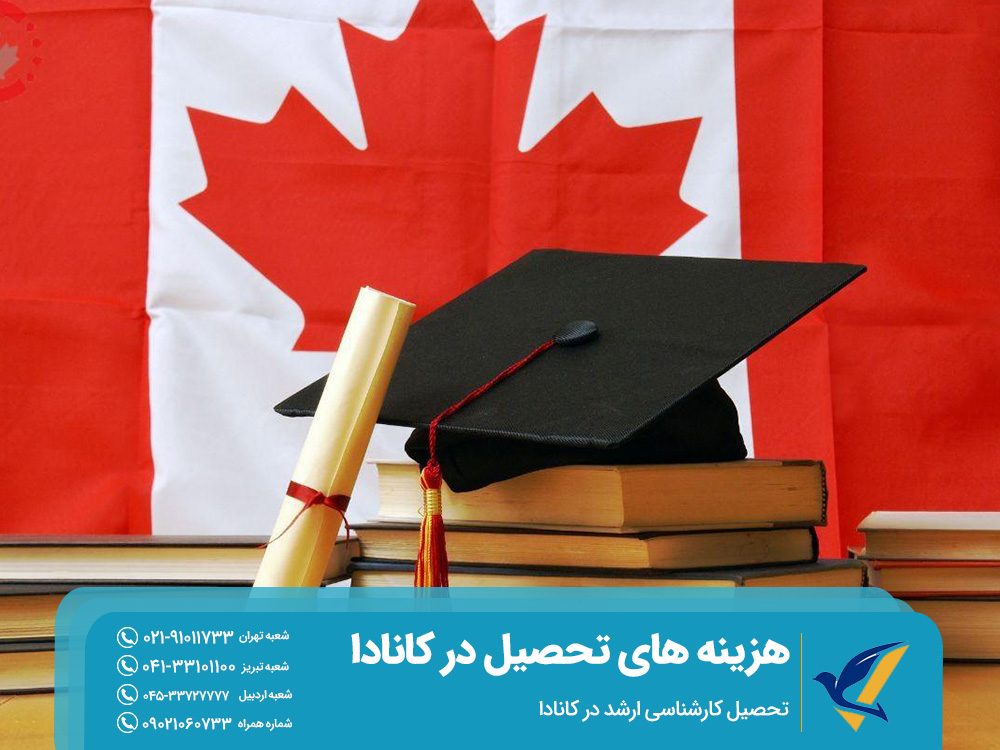As you may know, Canada is one of the largest destinations for international students. The cost of education in Canada is lower compared to other countries such as the United States, making it a popular choice for Iranian students. In this article, we aim to explore all aspects of studying in Canada, particularly the tuition fees of Canadian universities for Iranian students. To learn more about studying abroad in Canada, stay with us until the end of this article from Elm Vira.

Studying in Canada
In general, one of the main topics of discussion among Iranian students and even schoolchildren is migration. Among various migration destinations, Canada has always been the ideal and most popular option for educational migration, as it offers favorable conditions for those interested in studying abroad, a low unemployment rate, and the possibility of obtaining scholarships. Moreover, after completing their studies, individuals can find work in Canada. The advantage of studying in Canada lies in its lower tuition fees compared to American countries.
Studying in Canada has always been an excellent option for Iranian students wishing to continue their education abroad. As you may know, educational migration to Canada is possible for students at the undergraduate, graduate, and doctoral levels. Iranian students can also migrate to Canada for high school or lower levels, and even for college.
Advantages of Studying in Canada
As mentioned, migration to Canada is the top choice for many Iranian students. But why has Canada become such a popular option among Iranian students, and why do so many want to migrate to this country under any circumstances? Let’s review the advantages of studying in Canada:
Advanced Educational System: Studying in a top academic environment can certainly guarantee your future academic and career success. Canada has one of the most advanced educational systems, and individuals at any educational level can benefit from excellent conditions and facilities to further their progress.
Wide Variety of Programs and Universities: If you’re a student planning to migrate, you certainly understand the importance of program and university diversity in the destination country. In addition to the lower tuition fees in Canada, one of the most significant advantages of studying in Canada is the wide range of universities and academic programs. Regardless of the program you choose, you will ultimately have the opportunity to settle in Canada.
Canada is a Welcoming Country: As you know, 22% of Canada’s population consists of immigrants. Therefore, it can be said that Canada is a welcoming country and treats immigrants well. This is especially important for Iranian students who want to live a peaceful and prosperous life after migrating.
Opportunity to Study at a Low Cost: It is worth mentioning that after migrating to Canada for education, students have the opportunity to obtain scholarships or work while studying. This significantly reduces tuition fees, university costs, and living expenses in Canada. Overall, the cost of studying and living in Canada is not high, and students can have a good and affordable student life in the country.

Conditions for Studying in Canada
For students to migrate to Canada for education, they must meet certain conditions. For example, having financial capability, a valid language certificate, a high GPA, published papers in reputable journals, a suitable age, and more are among the most important requirements. If you meet all of these conditions, you will have a higher chance of obtaining a student visa and studying in Canada. Below, each of these conditions is explained in detail.
Receiving Admission from Canadian Universities
Certainly, the first condition for migrating to Canada through education is receiving admission from one of the country’s universities. To receive admission, you must submit your resume and application to these universities within the designated timelines. The necessary conditions for receiving admission from Canadian universities include:
- Tuition Fees and Financial Capability
As you know, one of the most important conditions for studying in Canada is having financial capability. You must prove to the Canadian government that you can afford the costs of studying and living in Canada for one year. The estimated financial requirement for one year of living in Canada ranges from 25,000 to 45,000 Canadian dollars.
This amount is for one person only, and if you bring a spouse or children, the living and tuition expenses will increase, and you will also need to calculate their living costs. To prove your financial capability, you must obtain necessary certificates from institutions such as banks and present them to the Canadian government.

- Valid Language Certificate with Sufficient Score
Another crucial requirement for educational migration to Canada is having a valid language certificate with a high score. Contrary to the belief of many people, it is not possible to study in Canada without a language certificate at the undergraduate level or higher. However, students can study at the high school or lower levels in Canada without a language certificate. For higher education, you will need a language certificate with the following details:
- IELTS certificate with a minimum score of 6 for undergraduate studies
- IELTS certificate with a minimum score of 6.5 for graduate studies
- IELTS certificate with a minimum score of 7 for doctoral studies
It is important to note that the required language score for studying in Canada may vary depending on the field of study and the university. For instance, some universities may require a minimum score of 6.5 or higher for undergraduate admissions.
- High GPA
It is worth mentioning that one of the main criteria for Canadian universities to grant admission to international students, in addition to the ability to pay tuition fees in Canada, is their GPA in the previous level of education. However, it is important to note that there is no minimum GPA requirement for high school and lower-level admissions.
To study in Canada at the undergraduate level or higher, you must have a GPA of 15 or higher in your previous level of education. Canada only offers educational opportunities to top international students, and you must demonstrate your academic ability to the Canadian government and universities.
- Publishing Scientific Papers
For students who have the financial capability to cover tuition fees in Canada and are planning to study at the graduate or doctoral levels, publishing scientific papers is a significant advantage. Students who have published papers in reputable academic journals have a much higher chance of receiving admission to top universities in Canada.
- Having a Suitable Age
Another factor that many people do not pay much attention to when considering educational migration to Canada is having an appropriate age. In general, undergraduate students should be between 19 and 25 years old. Graduate students can be between 25 and 27 years old to apply for educational migration to Canada. However, it is important to note that age is not as significant at the doctoral level, and students of any age can apply to continue their education at this level in Canada. However, individuals over 40 years old have a lower chance of being accepted for studies in Canada.
In addition to tuition fees in Canada, another crucial point regarding the age for studying in Canada is the concept of an educational gap. Students who do not meet the age requirements for educational migration at different levels need to justify the gap in their education. For example, if you obtained your bachelor’s degree at the age of 22 and are now 25 years old and applying for further studies in Canada, you need to explain the reason for the gap and prove that you have sufficient academic ability to continue your education.

- Receiving Recommendation Letters
Students who wish to pursue their graduate or doctoral studies in Canada are required to obtain at least two recommendation letters from their professors. Many Canadian universities place significant importance on recommendation letters, so it is essential to take this requirement seriously. The letters must be written by professors who have a reputable academic background in international academic circles.
Tuition Fees in Canada; Language Course Costs in Canada
As you may know, it is possible to receive admission to some educational institutions and universities in Canada without a language certificate; however, you must attend language courses in Canada. We recommend obtaining a valid language certificate from your home country to reduce the costs of studying in Canada and to facilitate the process of obtaining a Canadian study visa. The estimated costs for language courses in Canada are as follows:
- English language course in Toronto for 12 weeks: approximately CAD 3,500
- French language course in Quebec for 12 weeks: approximately CAD 3,570
- French language course in Calgary for 12 weeks: approximately CAD 3,400
- English language course in Vancouver for 12 weeks: approximately CAD 4,000
As you can see, the cost of learning French or English in Canada is quite high. Therefore, it is advisable to obtain your language certificate in your home country (Iran) to reduce your educational migration expenses.
Studying in Canada at Different Levels
In addition to being affordable in terms of tuition fees, one of the main advantages of studying in Canada is the availability of educational opportunities at all levels, including elementary, high school, college, undergraduate, graduate, and doctoral studies. However, each level has its specific requirements and documentation for admission and obtaining a study visa, and tuition fees at Canadian universities vary. Therefore, it is important to familiarize yourself with the conditions of each level. We will now review the requirements for studying at different levels in Canada.

- Studying in Canadian Schools
Generally, many parents seek educational migration for their children to secure their academic and career futures. The cost of education in Canada makes studying in Canadian schools an excellent option for these parents. In general, children over the age of 4 can apply to study in Canadian schools. However, it is important to note that the requirements for studying in Canada differ for individuals under 18 years old compared to adults. One of these conditions is the need to have a legal guardian.
Students must either migrate to Canada with their parents or have a close family friend or acquaintance approved by their parents living in Canada. Another important factor in studying in Canadian schools is proving financial capability to cover tuition fees and living expenses, as the cost of living and studying in Canada can be high. Required documents for studying in Canada include a birth certificate, academic transcript, proof of financial ability, educational certificates, and optionally a language certificate.
- Studying in Canadian Colleges
If you are looking for a quicker path to migrate to Canada and enter the job market, studying in Canadian colleges is an excellent option. Gaining admission to Canadian colleges is generally easier than gaining acceptance to universities, and the study duration is shorter.
The tuition fees in Canadian colleges are also much lower than those at universities. You can choose between public colleges or private business colleges. Some of the top colleges in Canada include Seneca College, Centennial College, and Humber College. It’s worth mentioning that to study in Canadian colleges, you need to have a language certificate and a diploma with a suitable grade point average.
- Bachelor’s Degree Studies in Canada
As you may know, many students take the university entrance exam with the sole aim of pursuing a bachelor’s degree in Canada because the Canadian government offers ideal conditions for international students at this level, in addition to reducing the cost of education. Popular fields of study for bachelor’s degrees in Canada include literature, management, engineering, economics, computer science, and geology.
The requirements for studying for a bachelor’s degree in Canada include having a high school diploma, a valid language certificate, a minimum IELTS score of 6.5, a GPA of 14 or higher, proof of financial ability to pay tuition fees and other conditions. A statement of purpose and a strong resume are also important documents for applying to a bachelor’s degree program in Canada.

- Master’s Degree Studies in Canada
If you are looking to advance your career and education for an exceptional future, pursuing a Master’s degree in Canada is an excellent option. The Master’s program is one of the most popular levels of education for migration to Canada. Canadian universities offer favorable conditions at this level, with reasonable tuition fees, and they easily admit international students. Popular Master’s programs in Canada include engineering, law, finance, computer science, medicine, dentistry, and more.
To pursue a Master’s degree in Canada, students should have a strong undergraduate degree. A language proficiency score of 6.5 to 7 (IELTS) is also required. Other important requirements include proof of financial capability to cover tuition fees, 2 to 3 recommendation letters from professors, a strong academic resume, and other supporting documents. It’s important to note that Master’s degree students in Canada have a high chance of receiving scholarships, and they are also allowed to work while studying.
- PhD Studies in Canada
Many individuals choose to pursue a PhD in Canada to enhance their scientific knowledge or to obtain residency in a developed country. One of the biggest advantages of pursuing a PhD in Canada is that there are no strict age limitations, and even individuals over the age of 40 with strong academic backgrounds can migrate to Canada through a PhD program. Fortunately, the process of pursuing a PhD in Canada is not too complicated, and with some effort, you can continue your studies at this level.
The requirements for PhD studies in Canada include having the necessary funds for education, a strong academic background, a high master’s degree GPA, published scientific papers in reputable journals, recommendation letters, and other factors. It is worth mentioning that many Canadian universities require you to attend an interview for PhD admission. Therefore, only students with advanced scientific knowledge who can effectively convince the university of their acceptance can pursue a PhD in Canada.
Tuition Fees in Canada
One of the main concerns for Iranian students seeking educational migration to Canada is understanding the tuition fees. Generally, tuition fees in Canada are lower than in countries like the U.S., although they may be higher compared to some European countries.
The tuition fees in Canada can be relatively high, so you should have sufficient financial capability for studying abroad. However, working while studying or receiving scholarships can significantly reduce the cost of education. The table below provides an overview of tuition fees at different academic levels in Canada:
Educational LevelApproximate Tuition Fees
Primary to Secondary Around 8,000 to 16,000 CAD
College Around 23,000 to 40,000 CAD
Bachelor’s Degree Around 10,000 to 20,000 CAD
Master’s Degree Around 13,000 to 25,000 CAD
PhD Around 6,000 to 16,000 CAD
It’s important to note that tuition fees can vary depending on the field of study. For example, studying fields like medicine can cost significantly more than the amounts listed in the table. However, the fees will not be lower than the minimum amounts listed above.

Living Costs in Canada
The cost of living in Canada depends on various factors, including the city where you reside and your lifestyle. Generally, the cost of living can vary greatly for each individual, as larger cities tend to be more expensive than smaller ones. According to the University of Montreal, the average living expenses for students amount to about CAD 14,700 annually, which includes costs such as housing, food, books, educational materials, and phone bills.
Similarly, the University of British Columbia, located in Vancouver, estimates that the average living expenses for students amount to CAD 15,500 per year, excluding health insurance. Health insurance costs CAD 864 annually in Vancouver. According to the 2023 Mercer Cost of Living Survey, Toronto is the most expensive city in Canada, with living costs comparable to those in Vancouver, particularly in terms of rent, which is higher than in other cities across Canada.
Here is a breakdown of some average living expenses in Canada based on the Numbeo website:
- Dining at a restaurant: CAD 16 per person
- One-way public transport ticket: CAD 3
- Loaf of bread: CAD 2.86
- Cinema ticket: CAD 13.50
- Monthly gym membership: CAD 48.25
In addition to tuition fees and proof of financial capability for studying in Canada, international students must have health insurance, which costs approximately CAD 600-800 per year. Additionally, you should budget for winter clothing and other personal expenses.
Summary
Deciding to pursue higher education abroad is a significant and life-changing decision. Many students seek advice on choosing the right destination, program, and university for their studies after completing their most recent degree. Due to the relatively lower cost of education in Canada compared to the United States, many Iranian students aspire to study there.
As mentioned, one of the essential requirements for studying in Canada is having the financial means to pay for tuition. If you have any questions about studying in Canada, feel free to visit the Elm Vira website and submit a free consultation request form to connect with our experts.
میانگین امتیازات 5 از 5
Vote count: 1 Vote